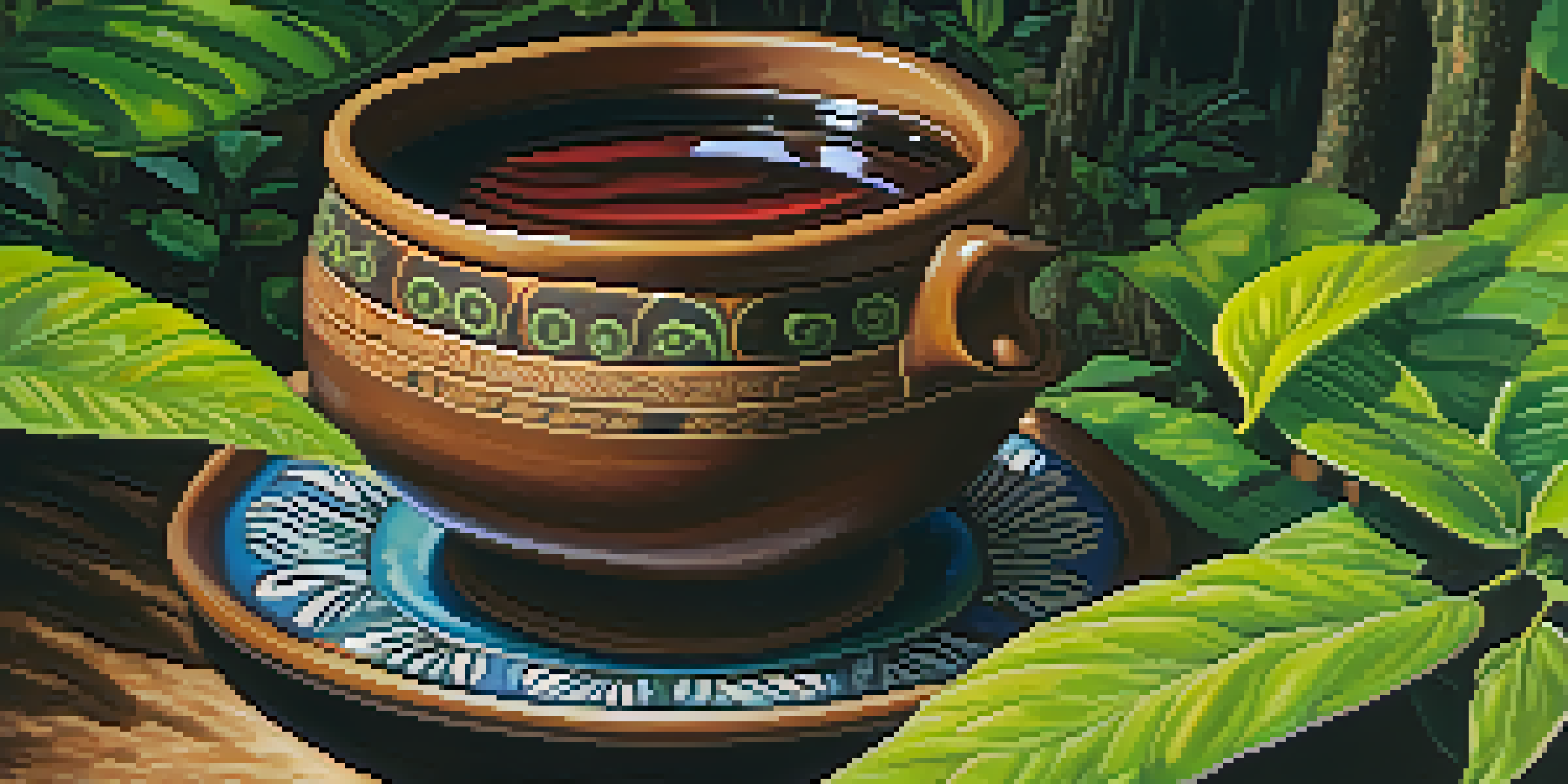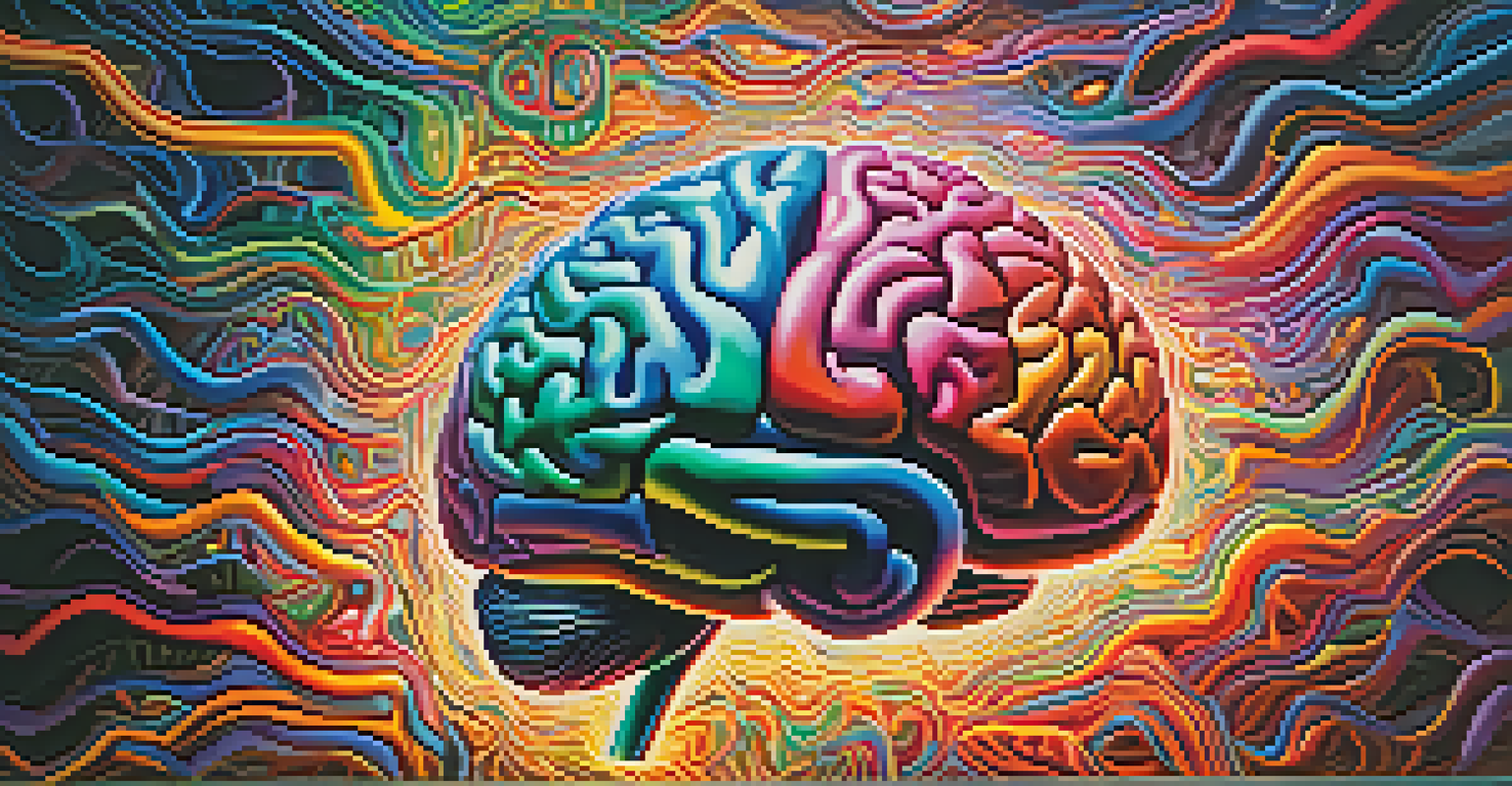Exploring the Role of Entheogens in Modern Psychiatric Care

Understanding Entheogens: Definition and Background
Entheogens are substances that are often used in spiritual or religious contexts to enhance consciousness. These can include naturally occurring plants and fungi, such as psilocybin mushrooms or ayahuasca. Traditionally, many cultures have utilized these substances for healing and introspection, providing them with a rich history that spans millennia.
Psychedelics can help us to see ourselves more clearly, to understand our emotions and our connections to others and the world around us.
In recent years, entheogens have piqued the interest of scientists and mental health professionals as potential therapeutic tools. This renewed attention stems from growing evidence suggesting that these substances can facilitate significant psychological breakthroughs. As we delve into their role in modern psychiatric care, it's essential to recognize the cultural and historical significance they carry.
The conversation around entheogens in psychiatry is not just about their chemical properties; it's also about understanding the human experience. By exploring how these substances have been used in various cultures, we can begin to appreciate their potential for fostering mental wellness in contemporary settings.
The Science Behind Entheogens and Mental Health
Research into entheogens has shown promising results in treating conditions like depression, anxiety, and PTSD. For instance, studies have indicated that psilocybin can help reduce depressive symptoms in patients who have not responded to traditional therapies. This is particularly exciting, as it opens the door for alternative treatments that may be more effective for some individuals.

The mechanisms of action for these substances are fascinating. They often involve altering neural pathways and enhancing emotional processing, which can lead to profound insights during therapy sessions. By understanding how entheogens interact with the brain, researchers can better tailor treatments to individual needs.
Entheogens Enhance Mental Wellness
Entheogens like psilocybin and ayahuasca are gaining recognition for their potential to treat mental health disorders by promoting emotional healing and self-discovery.
Moreover, the therapeutic context in which entheogens are administered plays a crucial role. When combined with psychotherapy, these substances can create a safe space for patients to confront and process difficult emotions, leading to transformative experiences that contribute to healing.
Current Research and Clinical Trials
Numerous clinical trials are currently exploring the efficacy of entheogens in treating various mental health disorders. For example, the Multidisciplinary Association for Psychedelic Studies (MAPS) is conducting studies on MDMA-assisted therapy for PTSD, showing encouraging preliminary results. This growing body of research is pivotal in legitimizing the use of entheogens within the mental health field.
The experience of psychedelics can lead to profound insights and transformative healing, often reshaping one's perspective on life.
In addition to psilocybin and MDMA, other substances like ketamine are gaining traction in psychiatric care. Ketamine, originally developed as an anesthetic, is now being used in controlled settings to treat severe depression. The ongoing research helps to further our understanding of how entheogens can be safely integrated into treatment protocols.
As these studies progress, they contribute to a wider acceptance of entheogens in mainstream psychiatry. The evolution of research not only helps to dispel myths and stigma but also paves the way for new, innovative treatment options.
Therapeutic Potential of Psilocybin
Psilocybin, the active ingredient in certain mushrooms, has shown remarkable promise in clinical settings. Research indicates that it can lead to rapid and lasting reductions in depressive symptoms, often after just one or two sessions. Patients have reported experiencing deep emotional releases and a renewed sense of purpose following treatment.
One of the most compelling aspects of psilocybin therapy is its ability to foster a sense of interconnectedness and spiritual insight. Many users describe their experiences as life-changing, with lasting impacts on their mental well-being. This aspect highlights the importance of integrating psychological and spiritual dimensions in mental health care.
Research Validating Therapeutic Use
Ongoing clinical trials are exploring the effectiveness of entheogens in treating conditions such as depression and PTSD, paving the way for innovative treatment options.
As we explore the therapeutic potential of psilocybin, it’s vital to consider the importance of dosage and setting. The environment in which psilocybin is taken, along with the guidance of trained professionals, can significantly influence the outcome of the experience.
Ayahuasca: A Journey of Healing and Insight
Ayahuasca, a traditional Amazonian brew, is gaining attention for its potential therapeutic benefits. It contains DMT, a powerful psychedelic, and has been used for centuries in shamanic rituals. Many participants report profound experiences of self-discovery and emotional healing after consuming the brew in a ceremonial setting.
Research on ayahuasca suggests that it may help individuals process trauma and develop new perspectives on their lives. The combination of the psychedelic experience and the supportive environment offered by shamans can lead to significant psychological breakthroughs. However, it’s crucial to approach ayahuasca with respect and caution, as the experience can be intense and challenging.
The growing interest in ayahuasca underscores the need for further research into its safety and efficacy in clinical settings. By studying ayahuasca, we can gain valuable insights into the intersection of culture, spirituality, and mental health treatment.
Challenges and Ethical Considerations
While the potential of entheogens in psychiatric care is promising, it also comes with challenges. One major concern is the lack of standardized protocols for their use in therapeutic settings. Without established guidelines, there’s a risk of misuse or inadequate support for individuals undergoing these experiences.
Additionally, ethical considerations around informed consent and the therapeutic relationship must be addressed. Ensuring that patients understand what to expect and feel safe throughout the process is paramount. This also includes considering the potential for adverse psychological reactions that may arise during or after an entheogen experience.
Ethical Challenges in Treatment
The integration of entheogens into psychiatric care raises important ethical considerations, including the need for standardized protocols and informed consent to ensure patient safety.
As we navigate the integration of entheogens into psychiatric care, it’s essential to uphold ethical standards and prioritize patient safety. By fostering an open dialogue about these challenges, we can work towards creating effective and responsible treatment frameworks.
The Future of Entheogens in Psychiatric Care
The future of entheogens in psychiatric care appears bright, with ongoing research and increasing acceptance among mental health professionals. As more studies validate their therapeutic potential, we may see a shift in how mental health disorders are treated. This could lead to a more holistic approach that combines traditional therapies with entheogen-assisted practices.
Moreover, as public interest grows, there’s a greater push for policy changes regarding the legal status of these substances. Advocacy groups are working to create frameworks that allow for safe and regulated use in therapeutic settings. This could greatly enhance accessibility for individuals seeking alternative treatment options.

Ultimately, the integration of entheogens into modern psychiatric care has the potential to transform the landscape of mental health treatment. By embracing these substances with careful consideration and respect, we can create new pathways toward healing and personal growth.